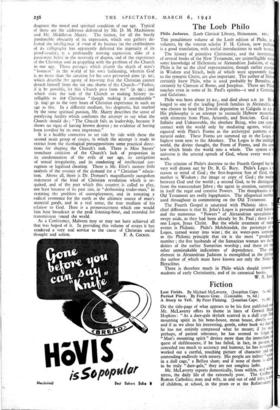The Loeb Philo
Philo Judaeus. (Loeb Clasical Library, Heinemann. los.) THE penultimate volume of the Loeb edition of Philo, in volumes, by the veteran scholar F. H. Colson, now publi is a good translation, with useful introductions to each treatise.
The history of primitive Christianity, and the interpreta of several books of the New Testament, are unintelligible wi some knowledge of Hellenistic or Alexandrian Judaism, of w Philo is for us the chief representative, though earlier exam in Wisdom and Sirach, both of which were apparently to the synoptic Christ, are also important. The author of Heb certainly knew Philo, who is used probably by Barnabas, certainly by Clement of Rome, and Josephus. There are Phil touches even in some of St. Paul's epistles—I and 2 Corin and Galatians.
Philo was born about 25 B.C., and died about A.D. 5o. He longed to one of the leading Jewish families in Alexandria, was chosen to head the Jewish deputation to Caligula in A.D. His philosophy is an attempt to reconcile Hebrew monoth with elements from Plato, Aristotle, and Stoicism. God is Infinite and Unknowable, the absolute Being, who can come contact with the world only by mediating agents, which equated with Plato's Forms as the archetypal patterns of natural order. These Forms are summed up in the Logos, highest term next to the Absolute. The Logos is the intelli world, the divine thought, the Form of Forms, and the c law which binds the world- into a whole. The system of universe is the uttered speech of God, whose every word n work.
The relation of Philo's doctrine to the Fourth Gospel has very well drawn out by Dr. R. G. Bury. Philo's Logos is reason or mind of God ; the first-begotten Son of God, mother is Wisdom ; the image or copy of God ; the med between God and the world ; a second God, to be distingui from the transcendant Jahve ; the agent in creation, summing in itself the regal and creative Powers. The theophanies in Old Testament are really logophanies. The allegorical method used throughout in -commenting on the Old Testament.
The Fourth Gospel is saturated with Philonic ideas. chief difference is that St. John's Logos is personal and histon and the numerous "Powers " of Alexandrian speculation swept aside, as they had been already by St. Paul ; there is one Logos, Jesus Chrikt. But the whole treatment of e events is Philonic. Philo's Melchizedek, the prototype of Logos, turned water into wine ; the six water-pots corres to the Philonic principle that six is the most " product] number ; the five husbands of the Samaritan woman are the deities of the earlier Samaritan worship ; and there are other unmistakable indications of dependence. The s element in Alexandrian Judaism is exemplified in the pro the author of which must have known not only the Stoics Heraclitus.
There is therefore much in. Philo which should interest students of early Christianity, and of its canonical books. W. R. IN


























 Previous page
Previous page